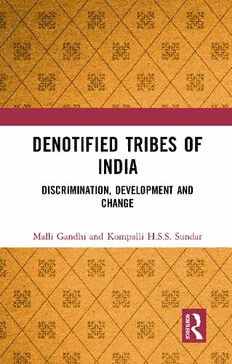
Denotified Tribes of India: Discrimination, Development and Change PDF
Preview Denotified Tribes of India: Discrimination, Development and Change
DENOTIFIED TRIBES OF INDIA Social stigmatization is a virtual curse imposed on certain Indian social sections by the colonial government as part of their contextual political strategies by late nineteenth century. The so-called denotified tribes (formerly known as ex-criminal tribes) in Indian society occupy this state-made category. Untouchability, on the other, was a Hindu cultural construct created and propagated by dominant upper classes. Legacy of these cultural/social and historical constructs continues till date in the country. According to the latest survey reports, India has 198 groups belonging to nomadic and denotified tribes: unorganized, scattered and utter nobodies. Social justice is alien to them and economic disempowerment eventually resulted in slavery, bonded labour and poverty. Public welfare measures pay scant attention to the issue of reform and rehabilitation of these sections and, they are made to suffer from an identity crisis today. Most of these communities are split under reserved categories: Scheduled Castes and Other Backward Classes. They rarely availed reservation facilities and other social welfare benefits which they are entitled to. A considerably large number of these communities are living in abject conditions: social, economic and political. The work tries to present a narrative detailing the conditions of denotified tribes during colonial and post-colonial India. And the undeclared wish in doing so is to seek the attention of those in policy-making and decision-making bodies under the Indian government. Malli Gandhi is presently working as Professor of History at Regional Institute of Education, NCERT, Mysore. His areas of interest are nomadic, semi-nomadic and denotified communities. He has published articles on criminal tribes, nomadic, semi-nomadic and denotified tribes in international and national journals. His earlier works on tribes include Development of Denotified Tribes: Policy and Practice (2006); Denotified Tribes: Dimensions of Change (2008); Tribes under Stigma: Problems of Identity (2009); Denotified Tribes: Retrospect and Prospect (2014); Educating Tribal Children: Issues, Concerns and Remedies (2014). Kompalli H.S.S. Sundar obtained his Doctorate from Central University, Hydera bad. His academic work is enriched by his experiences in social development sector. He was associated with two major social reform and rehabilitation drives in respect of denotified tribes and Jogini women undertaken by the reputed social reformer couple of Andhra, late Dr. Hemalata Lavanam and Lavanam. He has penned various articles, reports and academic monographs on the field work and represented the cause of reform and rehabilitation on various national and international forums. He has co-authored the latest biography on Hemalata Lavanam (as part of national biography series) published by NBT, Govt. of India. DENOTIFIED TRIBES OF INDIA Discrimination, Development and Change MALLI GANDHI KOMPALLI H. S. S. SUNDAR MANOHAR 2019 Firstpublished2020 byRoutledge 2ParkSquare,MiltonPark,Abingdon,OxonOX144RN andbyRoutledge 52VanderbiltAvenue,NewYork,NY10017 RoutledgeisanimprintoftheTaylor&FrancisGroup,aninformabusiness ©2020MalliGandhiandKompalliH.S.S.Sundar,andManoharPublishers &Distributors TherightofMalliGandhiandKompalliH.S.S.Sundartobeidentifiedas authorsofthisworkhasbeenassertedbytheminaccordancewithsections 77and78oftheCopyright,DesignsandPatentsAct1988. Allrightsreserved.Nopartofthisbookmaybereprintedorreproducedor utilisedinanyformorbyanyelectronic,mechanical,orothermeans,now knownorhereafterinvented,includingphotocopyingandrecording,orin anyinformationstorageorretrievalsystem,withoutpermissioninwriting fromthepublishers. Trademarknotice:Productorcorporatenamesmaybetrademarksor registeredtrademarks,andareusedonlyforidentificationandexplanation withoutintenttoinfringe. PrinteditionnotforsaleinSouthAsia(India,SriLanka,Nepal,Bangladesh, PakistanorBhutan) BritishLibraryCataloguing-in-PublicationData AcataloguerecordforthisbookisavailablefromtheBritishLibrary LibraryofCongressCataloging-in-PublicationData Acatalogrecordforthisbookhasbeenrequested ISBN:978-0-367-86182-7(hbk) ISBN:978-1-003-01762-2(ebk) TypesetinITCGalliardStd10/12 byManohar,NewDelhi110002 Essays in honour of VAKULABHARANAM LALITHA and VAKULABHARANAM RAMAKRISHNA* * For biographical notes see pp. 455-6. Contents List of Illustrations 11 List of Tables 13 Preface 15 Abbreviations 19 Glossary 21 PART I: UNDERSTANDING NOMADIC AND DENOTIFIED COMMUNITIES 1. Nomadic and Denotified Tribes: A Bird’s Eye View 25 2. Stigmatized Communities in India: A Human Rights Perspective 32 3. Tribes with Stigma: Historical and Legal Status 50 PART II: STATUS OF NOMADIC AND DENOTIFIED TRIBES UNDER COLONIAL RULE 4. Colonial Rule and Criminal Tribes: A Study of Criminal Tribes Acts in Andhra Pradesh, 1871-1965 75 5. Establishment of Criminal Tribe Settlements in Andhra: A Historical Survey 85 6. Tribes in Transition: A Study of Selected Denotified Tribes in Andhra Pradesh 105 7. Colonialism and Ex-Criminal Tribes: A Profile of Lingala Settlement in Telangana 115 8. Criminal Tribes Acts and Ex-Criminal Tribes of the United Provinces 121 9. Historical Profile of Koravas and Koramars/ Korachas in Karnataka 134 8 CONTENTS 10. Policy Recommendations and the Status of Nomadic, Semi-Nomadic and Denotified Communities: A Brief on Karnataka’s Experience 147 PART III: ADMINISTRATIVE ARRANGEMENTS AND DEVELOPMENT ISSUES 11. General Conditions and Administration in Settlements: A Case Study of Siddhapuram and Stuartpuram 157 12. Fiscal Management of Denotified Tribe Settlements in Andhra Pradesh 171 13. Economic Profile of Denotified Tribe Settlements in Andhra Pradesh: A Study of Siddhapuram Settlement 188 14. Perceptions and Approaches to ‘Criminals’ and Non-Criminals in Madras Presidency: Colonial Bureaucracy, Missionaries and Settlement Managers 197 15. ‘Criminal’ Tribes in the Princely State of Mysore: Measures of Surveilance 222 16. Land Allotment and Cultivation: Andhra Pradesh 229 17. Industrial Settlements for Ex-Criminal Tribes 240 18. Developmental Challenges, with Special Reference to Andhra Pradesh 257 19. Development of Nomadic/Denotified Tribes: Official Reports and Recommendations 277 PART IV: HEALTH AND EDUCATION 20. Health Interventions by Missionaries: A Study of Ex-Settlements in Andhra Pradesh 291 21. Education of Children: Madras Presidency Experience 303 22. Erosion of Tribal Dialects and Cultural Forms: A Study of Yerukulas 317 23. Life Skills Education and Human Capital: The Case of Tribal Children 337 CONTENTS 9 PART V: REFORM AND CHANGE IN SOUTH INDIA 24. Tradition and Change: A Case of Waddars of South India 349 25. Denotified Tribes in Andhra Pradesh: Social Reform and Rehabilitation 365 26. Case Studies: Life Sketeches of Reformed Ex-Criminals of Stuartpuram Settlement 386 27. Conclusion 426 Appendix 431 Bibliography 435 Index 447 Biographical Notes of Vakulabharanam Lalitha and Vakulabharanam Ramakrishna 455
